Useful Informations
Study Period Information
The structure of the doctoral education
In 1993, following Hungary’s adherence to the Bologna Process, the Anglo–American model of doctoral education ending with a PhD degree was introduced as a well–pronounced third cycle of higher education (the other two being the Bachelor and Master levels) that is to serve the education of future generations of scientists.
Doctoral education is about getting prepared for a research career and thus offers an opportunity to acquire the theoretical, methodological and communication skills that are instrumental to writing the doctoral dissertation and to meeting the necessary requirements.
Doctoral education at the same time marks the beginning of a long process of socialization: it is a decisive phase in getting introduced to the academic form of life. Up to now around 1500 students have obtained a PhD degree at the Corvinus University of Budapest or one of its legal predecessors and there are several hundred students who are currently getting ready for the submission of their doctoral dissertation. This study guide is intended mainly for students who began their studies after 1 September 2016 in the so–called „new type” of doctoral education. It contains all the basic information that is needed to find one’s way in the world of the Corvinus Doctoral Schools.
Corvinus Doctoral Schools (CDS): Umbrella organization coordinating doctoral programs at the Corvinus University of Budapest. The most important tasks of CDS are to facilitate the effective functioning of the professionally autonomous doctoral schools, to ensure smooth communication, efficient administration and educational management, to maintain the competitiveness of the education of future generations of scientists. CDS is headed by a Director General who is also the Chairman of the Doctoral Cabinet.
Doctoral Cabinet (DC): Consultative body composed of the Heads and Program Directors of the Doctoral Schools. It gives an opinion on regulatory, budgetary and strategic matters related to the Corvinus Doctoral Schools. The Cabinet also prepares the upcoming meeting of the University Doctoral Council.
University Doctoral Office (UDO): Organizational unit in charge of the administration of doctoral education overall, including both service centre activities and office functions, among others it deals with the administration of the doctoral admission procedure, registration, course registration, the comprehensive exam and the public PhD defence. It keeps official records, issues documents and certificates.
University Doctoral Council (UDC): The supreme decision making body responsible for doctoral education. It is comprised of the Heads, Program Directors of the Doctoral Schools, their delegates as well as external experts. The Council meets twice each semester and takes decisions on matters like admissions to doctoral schools, on the composition of the Evaluation Committees of public defences and on awarding the PhD degree.
Secretariats of the Council of Doctoral School (CDS Secretariats): The operation of each doctoral school is supervised by a Council elected by the Core Members of the Doctoral School. The Secretariats provide administrative support to these bodies, as well as to the Heads and Program Directors of the Doctoral Schools. They are in charge of organizing the defence of the thesis proposal, handle applications from students, coordinate the administration of credit request forms, provide information, they also represent the main forum for liaising with students and lecturers.
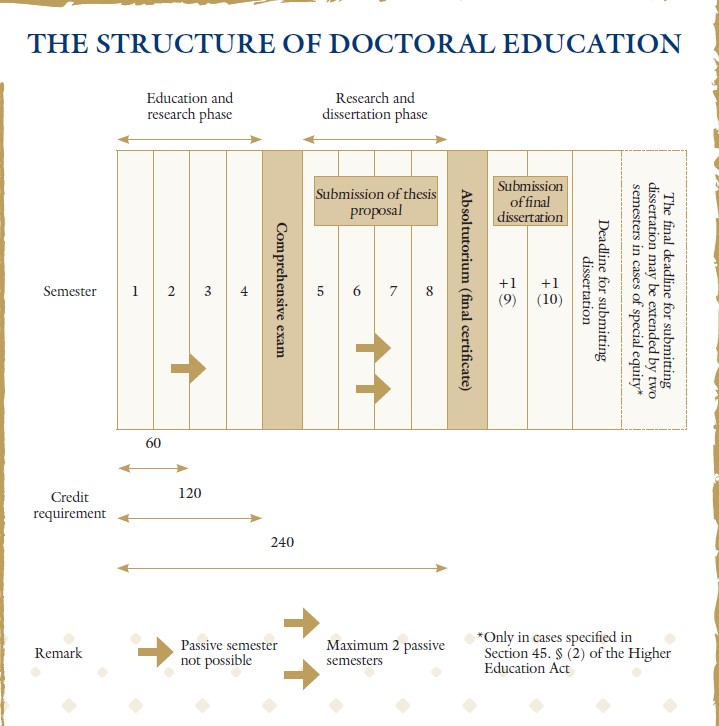
The Doctoral Schools of CUB
The doctoral schools of the Corvinus University of Budapest operate with a licence obtained from the Educational Authority under the constant monitoring of the Hungarian Accreditation Committee.
The language of education is Hungarian and English, with most of the courses held in English owing to the increasing number of foreign students and the internationalisation of the university.
The programs offered by the four doctoral schools are essentially related to social sciences, the Doctoral School of Business Informatics however transmits knowledge in the field of engineering as well. The deeper we dig in the activities of the doctoral schools, the more we witness the wide range of the branches of science offered from management and organizational sciences through information, economic, political and sociological sciences to media and communication sciences.
The schedule of all doctoral programs is full–time. Students either benefit from state scholarship or finance their own studies. The latter, however, can apply for various grants (e.g. the MNB Scholarship of Excellence). The Heads of the Doctoral Schools are internationally renowned professors who hold a DSc and are assisted by Program Directors and Heads of Specialization.
The Doctoral Schools enjoy scientific autonomy: they define their educational program (curriculum) within the framework of the relevant university regulations, invite professionals to act as supervisors and specify the requirements of obtaining a doctoral degree.
The first steps
Registration
Colleagues at the University Doctoral Office record in the Neptun system students’ personal data, check documents and degrees related to previous studies (the originals must be presented).
Importatnt: During the program the student’s e–mail address featured in the Neptun system is the most widely used communication channel. Therefore if a student’s e–mail address changes, he or she should immediately notify the University Doctoral Office.
Course Registration
Following registration the student should himself/herself register in the Neptun system for the courses i.e. the compulsory, compulsory elective and elective subjects prescribed for the given semester in the curriculum.
Important: If needed, colleagues at the University Doctoral Office can help register for courses.
Choosing a supervisor
The supervisor is key to the successful advancement of students. In most of the Doctoral Schools the person of the supervisor emerges during the admission process (mentor supervisor), the supervisor however is not finalized before the first meeting of the Council of the Doctoral School.
Important: The student should seek to establish an intensive relationship with the supervisor (mentor) from the very outset. If he/she does not have a supervisor yet, it is advisable to get in touch with the management of the relevant Doctoral School without delay to identify the most suitable person and to be able to start working together.
Access to databases
Obtaining the so–called Cusman username and password is indispensable for communication and access to databases (Neptun, intranet, library). Doctoral students may also request an email address with the following format: name@ uni–corvinus.hu. Students are registered in the doktori.hu database by the University Doctoral Office. Registration in MTMT (Hungarian National Scientific Bibliography) , by contrast, should be done by the student himself/herself.
Important: foreign students are assisted in this exercise by the librarian indicated by the Doctoral School
Milestones
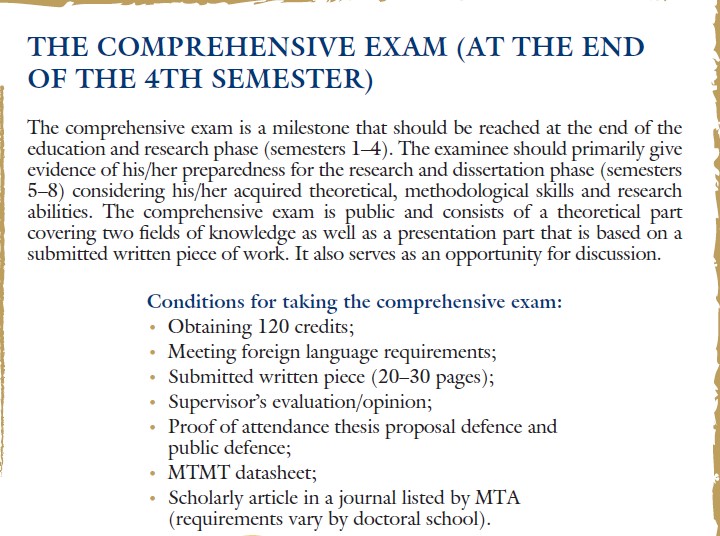
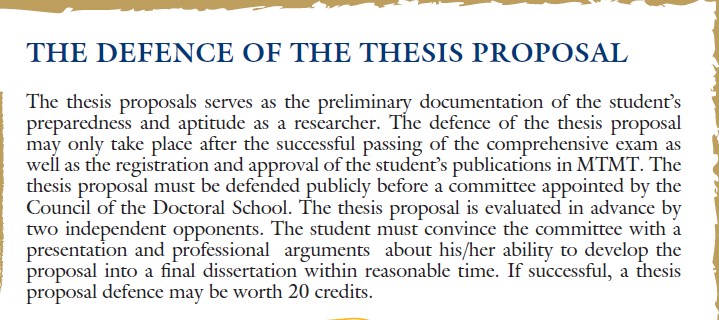
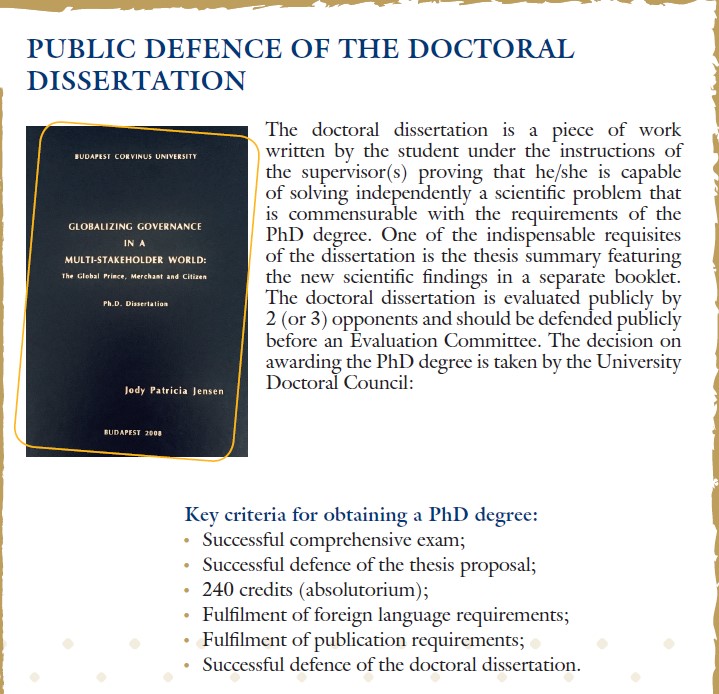
Administration of doctoral matters
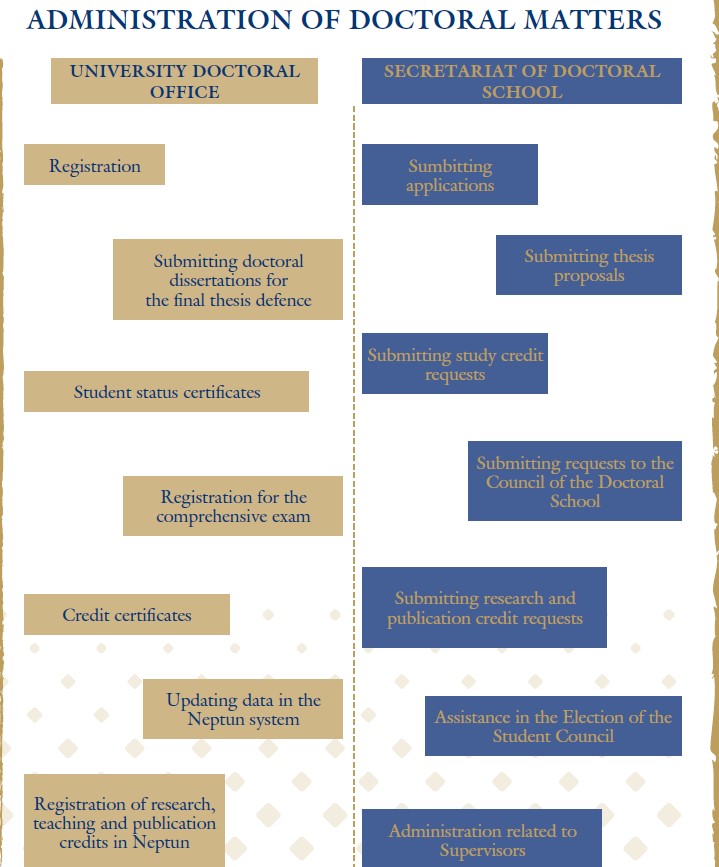
Schedule of the academic year
Related documents
Q&A – Fixed credit system
General rules
Q: Where should I turn with my questions?
A: Please send an e-mail to phd.office@uni-corvinus.hu.
Q: Does the new system apply to all doctoral students, or only to current first years?
A: The new system applies to all current students, including those now in their 2-4th years.
Q: What about those credits (research or publication) which were earned in the first 2 years, and we expected to carry them into the 3-4 years?
A: As a temporary measure, the extra credits earned will count towards research credits in Fall 2022.
Q: I just finished my first year and collected fewer than 30 research credits. How can I make up for the missing credits in the new system?
A: The missing credits will be given as special compensating credits (a one-time measure) in Fall 2022.
Research credits
Q: How do we transfer the research credits that we received in the first phase but were not registered on Neptun due to overload credits?
A: You can transfer extra credits (as a one-time measure), up to the amount that you would have been able to in the old system. The transfers will count towards your Fall 2022 research credits. No additional credit transfer is possible.
Q: If I want to get all credits required for two semesters in one semester and transfer it to the another, is it acceptable?
A: Formally you cannot transfer credits between semesters. If you do more in a semester than you agreed on with your supervisor, you should include those extras in next semester’s deliverable list.
Teaching credits
Q: Is there a central forum (email address to chase etc.) to apply for teaching credits-related services (participate in curriculum development, mentoring, thesis revision etc.)?
A: No, you must talk to your advisor, program director and institute head about these.
Q: Can we earn 6 teaching credits if we teach in a “co-authorship”, I mean, with a professor together or with another doctoral student?
A: Yes, if you teach two units (2×45 minutes) per week, you can get 6 credits.
Course credits
Q: Is there any change in how course credits are earned?
A: No, there is no change.
Q: Are course credits “semester-fixed” like the research ones? If I have already obtained 48 course-credits in the first year, do I have to take 12 course credits minimum also in the following semesters?
A: No, they can still be collected flexibly as before.